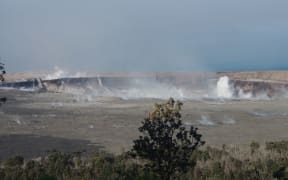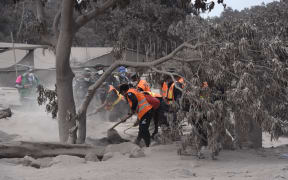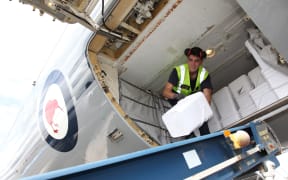Mt Taranaki is "geologically-speaking due" and people need to be prepared for an eruption, the Taranaki Civil Defence says.

Photo: RNZ / Robin Martin
The region's new five-year Civil Defence plan identified preparation for a potential volcanic erruption as top priority.
Civil Defence group manager Craig Campbell-Smart said events in Guatemala and Hawaii have highlighted how important it was to be prepared.
"We could be dealing with what's called the pyroclastic density flow in the worst case ... and it's something that we need to be able to prepare, forecast and respond to," Mr Campbell-Smart said.
New research showed an increase in the likelihood of an eruption on Mt Taranaki from 1.6 percent to 3.1 percent in any given year, Mr Campbell-Smart said.
The five-year plan stated the likelihood of a volcanic event was "almost certain" while its consequences were labelled "catastrophic".
In the case of an erruption, many towns and villages in Taranaki would be affected, ranging from Inglewood and Egmont Village in the "red zone" which posed the most risk to human life.
The orange zone, which included Bell Block, Waitara, Okato, Opunake, Stratford, Eltham, Manaia and Kaponga, would be severly affected and require evacuation.
Urenui, Hawera, Patea and Waverley - the yellow zone - would be affected by ash fall.
Other towns at risk included New Plymouth and Oakura which were in the green zone - the area most sheltered from volcanic hazards except ash fall.
There are three GNSS sites located on or near Mt Taranaki to monitor ground deformation that may indicate volcanic activity and in ideal circumstances allow an orderly retreat.
The preparation plan also stated moderate to large eruptions of Mt Taranaki have occurred on average every 500 years, with smaller eruptions occurring about 90 years apart.
Taranaki Civil Defence is also looking to train up to 500 volunteers to meet the challenges of extreme localised weather events.
Mr Campbell-Smart said the organisation is going to decentralise and establish emergency operations centres at district council level to respond to local emergencies
Previously operations had been run from a single control point in New Plymouth.
Mr Campbell-Smart said this was a response to the type of emergencies Civil Defence was now facing.





